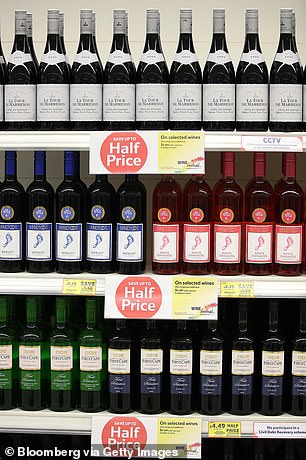Drinking limits should be set lower for fat people because alcohol causes them more harm, experts say.
Overweight drinkers who follow British recommendations of no more than 14 units a week are three times more likely to develop cancer than lean people.
A University of Sydney study looked at data from 400,000 British adults aged between 40 and 69 and looked at how many developed alcohol-related cancer over a 12-year period.

Bottles on the wall: Higher fat levels appear to “increase” the harmful effects of alcohol.
They found that higher fat content appeared to “increase” the harmful effects of alcohol. Compared to never-drinkers with the lowest body fat, those with the highest fat who drank within alcohol limits were 53 percent more likely to develop cancer, including mouth, throat, larynx, liver, colon, stomach and breast cancer.
But those with the lowest body fat who drank within limits were only 19 percent more at risk.
People with the most fats who drank above the limits were 61 percent more likely to develop cancer.
Dr. Elif Inan-Eroglu, who led both studies at the University of Sydney, said: "Alcohol consumption guidelines should take people's obesity into account.
“People with obesity, particularly those with excess body fat, need to be more aware of the risks of alcohol consumption.”
The UK's chief medical officers advise men and women to regularly drink no more than 14 units a week, spread over three or more days.
Dr. However, Inan-Eroglu warned that these guidelines were too general, adding: "Whether you are normal weight or obese, there is no difference - but it should be so."
Higher drinking levels for people of healthy weight could even serve as "motivation," she suggested, because "if I eat less, I can drink more."
Dr. Inan-Eroglu added: “People who are overweight and obese should consume alcohol with caution.
“From a cancer prevention perspective, the safest level of alcohol consumption is complete avoidance.”
The researchers adjusted their results to take into account other factors that could influence their findings, including age, gender, diet, education level, physical activity, smoking status, sleep duration, socioeconomic status and existing cardiovascular disease or type 2 diabetes.
Tam Fry, chairman of the National Obesity Forum, said: “This study is bad news if you're fat and have a hangover this morning - but it should teach you a lesson.
“Because manufacturers are mistakenly not required to put calorie information on the bottle of their favorite drinks, many people are unaware of the amount of calories they are consuming and leading to cancer.
"Simply put, avoid binge drinking like the plague. You'll be much healthier for it." Professor Sir Ian Gilmore, Chair of the Alcohol Health Alliance UK, said: "Alcohol is responsible for 46 new cases of cancer in the UK every day.
“This latest research is a further reminder of the damage alcohol can do to our health, and in particular highlights the combined cancer risk of obesity and high-calorie alcohol.
“It also highlights the urgent need for the Government to ensure that measures to reduce alcohol consumption are part of the wider obesity strategy.
“We owe it to the health of our country to implement a minimum unit price for alcohol and comprehensive restrictions on the marketing and availability of alcohol.”

Alcohol causes 46 new cases of cancer in the UK every day - with overweight people being the most vulnerable
Dr. Alison Giles, chief executive of the Institute of Alcohol Studies, said: “The health community has known for years that alcohol causes cancer and that your risk increases even within the UK 14 unit guidelines.
“We also know that this risk increases with higher body fat percentage, so it is good to see research looking at combined risk factors.
“It is crucial that people who drink alcohol understand these risks, and better product labeling and public health campaigns can raise awareness.
“Health professionals can also help people understand this by talking to people living with obesity about alcohol consumption as a cancer risk factor.
“The alcohol industry will no doubt say this is ‘scaremongering’ when the point is simply that people have the right to know the health risks of alcohol in order to make informed decisions about what they consume.”
Matt Lambert, chief executive of Portman Group, said: “We believe in clear information on packaging that supports rather than confuses consumers.
“It is likely that having different instructions for people would be confusing, counterproductive and possibly patronizing.
"We support the inclusion of CMO guidance on labeling, which can be found on the vast majority of UK alcohol products. Likewise, almost half of products list calories on labels, which is more likely to be useful for someone looking at their diet."

 Suche
Suche
 Mein Konto
Mein Konto

